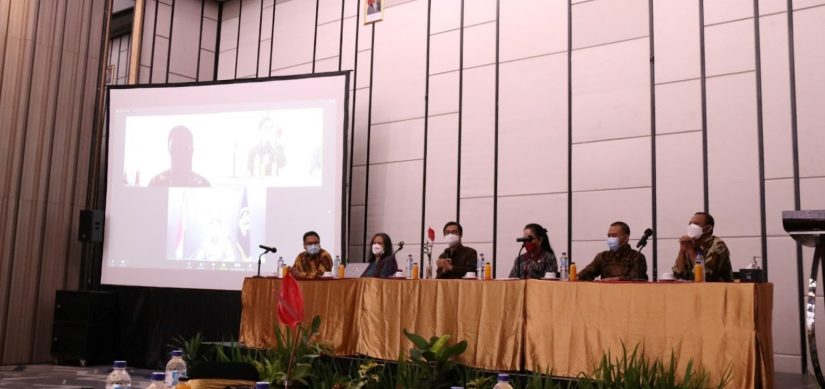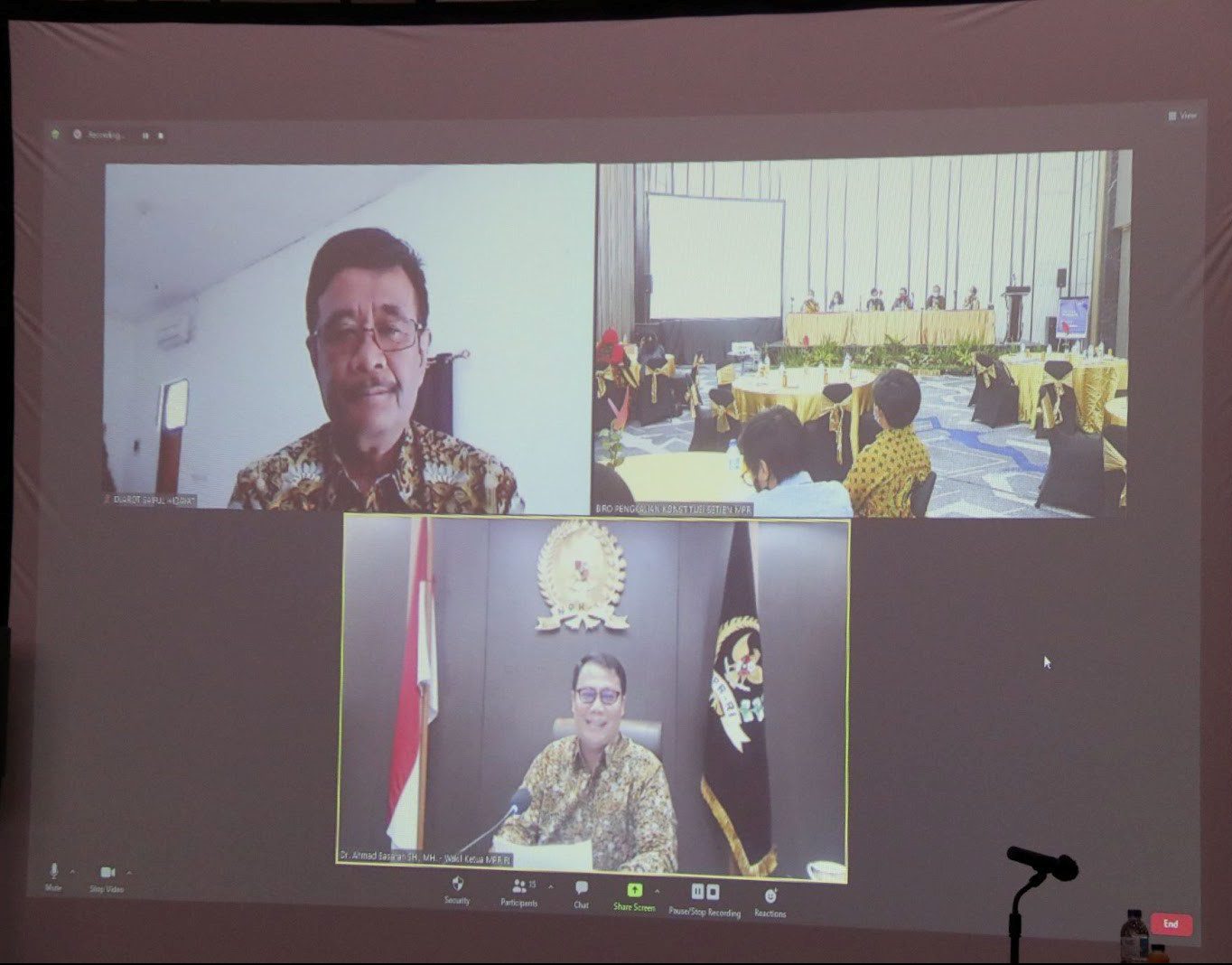
Yogyakarta, December 30th 2021─Faculty of Social and Political Sciences (Fisipol) Universitas Gadjah Mada (UGM) in collaboration with the People’s Consultative Assembly of the Republic of Indonesia (MPR RI) held a discussion with the theme “Consolidating Democracy and Strengthening the Ideology of Pancasila”. The event, which was held in a hybrid way (online and offline), at the Ballroom of Novotel Suites Yogyakarta Malioboro and the Zoom Meeting virtual room, presented speakers consisting of academics and political practitioners from the MPR and DPR RI. The event was opened by MC Debora Putri and then the discussion was guided by a lecturer from the Department of Politics and Government (DPP) of Fisipol UGM, Joash Tapiheru. The Dean of Fisipol UGM, Wawan Mas’udi, and the Deputy Chair of the Indonesian People’s Consultative Assembly, Ahmad Basarah, gave a speech at this event.In his speech, Wawan explained that the discussion with the MPR RI aimed to examine the issue of democracy in Indonesia. According to Wawan, the substantive aspect, namely the ideology of Pancasila, is important to consider when discussing democracy.
“Democracy must contain elements of human rights and place the people as the holder of sovereignty,” Wawan said.
Furthermore, Ahmad explained about the threats facing the Pancasila ideology. According to him, in the midst of disruption and globalization, the concept of ideology is considered obsolete by a number of groups. Ahmad explained about the behavior of some Indonesian people who were influenced by the liberal democratic system. In fact, according to Ahmad, Indonesian democracy does not need to be identical with democracy run by other nations.
“Indonesian democracy must be filled with our own spirit and personality,” Ahmad said.
“Democracy should strengthen the understanding and implementation of Pancasila, but on the contrary, the current democratic system deviates from Pancasila and even questions Pancasila,” said Djarot Saiful Hidayat, Chair of the MPR Study Board, starting the first session of the discussion.
According to Djarot, democracy developed by the Indonesian nation should be rooted in the nation’s personality. Because, the Indonesian nation is a communal nation with the character of gotong royong. He proposed four ways to improve democracy: 1) simplification of elections, 2) simplification and strengthening of political parties through the parliamentary threshold and presidential threshold, 3) bureaucratic reform by creating a state civil apparatus free from party politics, and 4) strengthening political parties in political education for the cadres.

Member of the Indonesian House of Representatives Commission X, Ny. Esti Wijayanti, proposed an idea on how to strengthen Pancasila democracy from the point of view of female politicians. According to Esti, gender equality and the involvement of women in political institutions affect the strengthening of the Pancasila ideology.
“The more women are given space in legislation, I think this will be a reinforcement for Pancasila democracy,” Esti said.
Experts from the MPR Review Board and the Dean of the Faculty of Humanities at President University, Endi Haryono, delivered material entitled “Pancasila, Nawacita Vision, and Advanced Indonesia Vision”. Endi explained that Nawacita had not yet realized the consolidation of Pancasila (mental revolution and diversity). He added that the consolidation of Pancasila cannot be placed in a political agreement, but must be inherent in national education and the implementation of a mental revolution.
“The mental revolution should be for civil servants and government administrators, not the general public,” Endi said.
In the second session, a lecturer from the Faculty of Social and Political Sciences of UGM, Abdul Gaffar Karim, conveyed the results of the research of researchers from the Faculty of Social and Political Sciences UGM in the past two years. He explained that the different social characteristics in various regions caused the practice of democracy in Indonesia to be not the same. The research shows that regions in Indonesia have direct communication channels with each other. The central government needs to facilitate a good public process.
“Democracy that seeks to be the same with one paradigm, does not produce a substantive democracy,” Gaffar said.
Furthermore, a lecturer at the Department of International Relations of the Faculty of Social and Political Sciences of UGM, Diah Kusumaningrum, explained about the criteria for citizens to maintain democracy. Some of them are people who are ready to humanize, people who collectively and working together are ready to protect weak groups, and people who are ready to conflict non-violently so that democracy is not disturbed and is getting stronger.
“We need a more creative approach to personally bring people closer to the values of Pancasila without being labeled as Pancasila,” said Kuskridho Ambardi, a lecturer at theDepartment of Sociology of the Faculty of Social and Political Sciences UGM.
He explained, there has been an essential change in defining audiences nationally since the advent of digital technology. Therefore, the old method of socialization is considered outdated, because it cannot reach a broad audience and the form of persuasion is no longer relevant to current conditions.
